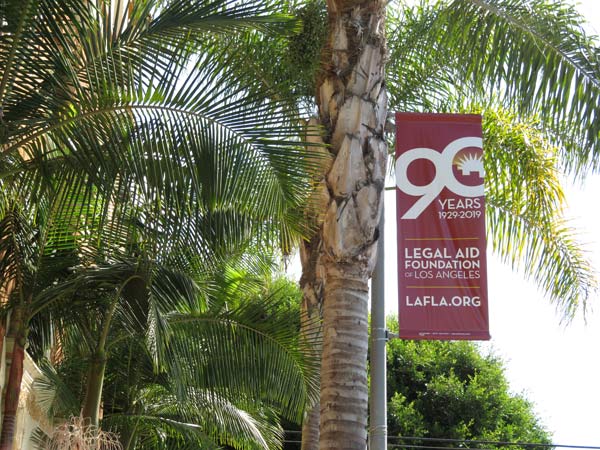LOS ANGELES, July 18, 2019 — Seven unhoused residents, living in Los Angeles neighborhoods from Van Nuys to Harbor City, along with two community organizations, filed a lawsuit today against the City of Los Angeles to challenge the constitutionality of Los Angeles Municipal Code Section 56.11, which the City has used to justify the ongoing practice of seizing and destroying homeless people’s critically important belongings—including tents, medications, important documents, and other items they need to survive on the streets. The Legal Aid Foundation of Los Angeles (LAFLA), Schonbrun Seplow Harris & Hoffman LLP (SSHH), and Kirkland & Ellis LLP represent the plaintiffs.
Janet Garcia, Jane Zepeda, Miriam Zamora, Ali El-Bey, James Haugabrook, Pete Diocson Jr. and Marquis Ashley allege that, pursuant to LAMC 56.11, the City routinely seizes and destroys homeless people’s belongings. According to the ordinance, LA Sanitation and LAPD do not need a warrant or to give homeless people any notice before they seize items they determine are “bulky” or in excess of 60 gallons. Homeless people have no opportunity to contest city workers’ on-the-spot determination that items can be immediately destroyed; and in fact, the ordinance allows LAPD to arrest anyone who attempts to challenge LA Sanitation’s decisions. As a result, in the fourth quarter of 2018, the city teams tasked with enforcing LAMC 56.11 visited more than 2,000 encampments and threw away more than 435 tons of debris, but sent less than 160 bags of belongings to storage.
Among the items thrown away by LA Sanitation were Janet Garcia’s tent, clothing, bike repair tools, and cleaning supplies she needed for her job as a house cleaner, all of which were seized and destroyed during a sweep in January 2019. Ms. Garcia had no notice of the cleanup, and she had stepped away from her tent momentarily to get ready for work. When she returned, sanitation workers were throwing away all of her belongings. This was not the first nor last time she lost her belongings.
Ms. Garcia stated, “I work as a house cleaner and I have had my cleaning supplies taken from me multiple times. Every time I lose my belongings, I have to start over. How am I supposed to get back up on my feet when they keep making me go back to square one?”
Other plaintiffs’ belongings that have been destroyed pursuant to the City’s policies include a kennel used by a plaintiff to keep his dog safe and homemade carts a plaintiff was using to transport his belongings during the many cleanups conducted by LA Sanitation. In both instances, LA Sanitation and LAPD determined the items were “bulky” and they were immediately destroyed. In another instance, a plaintiff’s tent was seized and then thrown away because it was wet.
“Discarding people’s belongings with arbitrary discretion and confusing rules harms their health and impairs their ability to work and find housing. The current practices and the law underlying them are unconstitutional,” stated Plaintiffs’ attorney Catherine Sweetser.
The organizational plaintiffs are Ktown for All, an organization formed to advocate for housing the homeless, and Association for Responsible and Equitable Public Spending, which is challenging the City’s expenditure of tax dollars on the enforcement of an illegal ordinance.
The lawsuit comes after months of attempts by attorneys and community organizations to address these issues without litigation. In September 2018, LAFLA and SSHH, representing a number of community organizations, including Plaintiff Ktown for All, sent a letter to Mayor Garcetti and the City Council, raising concerns about the constitutionality of LAMC 56.11 and the City’s enforcement practices. In addition, a coalition of organizations, Services not Sweeps, has been pushing publicly for months for reforms to the City’s cleanup policies and greater investment in public health infrastructure like toilets, showers, and routine trash pickups.
The City has announced some changes to the way the City responds to homeless encampments, but to date, there has been no movement by the Los Angeles City Council to address the constitutionality of LAMC 56.11. Instead, LA Sanitation has publicly dismissed concerns that sanitation workers are throwing away people’s belongings, and the City Council has allocated additional funding to enforce the law.
“It has always been our hope that the unconstitutionality of LAMC 56.11 and the City’s enforcement practices could be resolved without more costly and time-consuming lawsuit,” said Shayla Myers, Attorney, Legal Aid Foundation of Los Angeles. “But these practices, and the ordinance that justifies them, are actively harming our clients and making this crisis worse. The City’s failure to address these concerns left us with no other option but to bring this lawsuit.”
Benjamin Herbert, a partner at Kirkland & Ellis, who is representing the plaintiffs pro bono with LAFLA and SSHH said, “Homelessness is a significant and persistent issue here in Los Angeles. While there’s no easy fix to this extremely complex situation, what we can do is ensure that the constitutional rights of this already vulnerable population are protected. We are hopeful that the lawsuit will stop this harmful practice and better protect our city’s homeless residents and their property.”
About Legal Aid Foundation of Los Angeles
Legal Aid Foundation of Los Angeles (LAFLA) seeks to achieve equal justice for people living in poverty across Greater Los Angeles. LAFLA changes lives through direct representation, systems change and community empowerment. It has five offices in Los Angeles County, along with four Self-Help Legal Access Centers at area courthouses and three domestic violence clinics to aid survivors.
About Schonbrun Seplow Harris & Hoffman LLP
Schonbrun Seplow Harris & Hoffman LLP is a plaintiffs’ side firm which focuses on civil rights, international human rights, and plaintiffs’ side employment litigation.
About Kirkland & Ellis LLP
Kirkland & Ellis is an international law firm with 2,500 attorneys representing clients in private equity, M&A and other complex corporate transactions, litigation and dispute resolution/arbitration, restructuring, and intellectual property matters. The Firm has no headquarters location, and operates from 15 offices around the world: Beijing, Boston, Chicago, Dallas, Hong Kong, Houston, London, Los Angeles, Munich, New York, Palo Alto, Paris, San Francisco, Shanghai and Washington, D.C.

